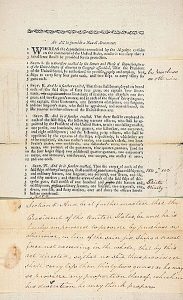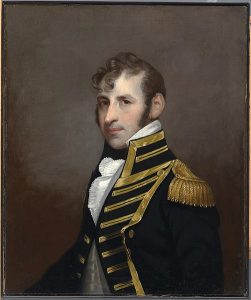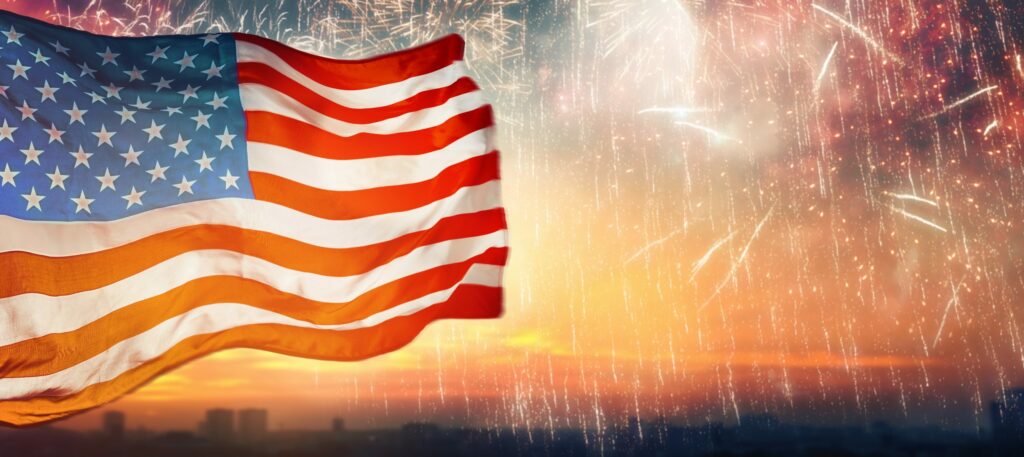The United States Marine Corps has a world-renowned reputation as one of the most capable, and most elite, fighting forces on the planet. Many people are equally familiar with the lyrics of the Marine Corps Hymn. Frequently, however, little thought is given to the meaning behind those lyrics. This week, we’re going to talk about one of those lines, and how it relates to the present day.
After the United States gained its independence from England in 1783, the new nation suddenly found itself on its own in the wider world. While this did not too present much of a problem in most places, it quickly became a very serious problem along the coast of North Africa, past which, American-flagged merchantmen were carrying cargoes into Mediterranean ports, as they had done for decades.
The problem now, though, was that the ships were American – not British. Great Britain in the 18th Century had, like many of the countries of Western Europe, come to an agreement with the Muslim pirates of the so-called “Tripolitanian Coast” where the Europeans would pay the Barbary Pirates what their leader, Pasha Yusuf Karamanli grandiosely termed “tribute” – the Europeans termed it “bribes” – to not attack those nation’s vessels. Ever since the payments began, American-based ships had been able to sail freely, as they flew the British flag, and carried British papers. After 1783, however, that all changed.
The Barbary Pirates – a group of coastal city-states including Algiers, Tripoli and Tunis – under the nominal control of the Sultan of the Ottoman Empire, had been the naval scourge of the Mediterranean for nearly six hundred years. Their raids to capture Christian European vessels, and enslave their crews, were exceeded only their slave raids along European coasts – ranging as far north as Iceland – raids that were so frequent, a significant portion of the population actually fled coastal areas, moving father inland to get away from the raiders.
European states, embroiled in constant wars with each other, were unable to continuously focus their otherwise-considerable military power against the corsairs. In a time-honored tradition, those countries resorted to simply paying the pirates to leave their ships and coasts alone. In reply, the pirates toned down their raids, only attacking (mostly) when payments were delayed for some reason. When the United States became independent, it had no standing agreement with the Barbary pirates, making its ships and merchants vulnerable.
In response to this sudden turn of events, US President George Washington convinced the US Congress to pass the Naval Act of 1794, authorizing the creation of the US Navy and Marine Corps – both of which had been disestablished at the end the War of Independence – for the specific purpose of cruising against “Algerian corsairs”.

Although it took a few years, the new ships of the US Navy were eventually launched, and their crew – including the newly restored US Marines – headed out to deal with the Barbary pirates.
It got off to a rocky start – pun intended.
Although scoring some early victories against the pirates, the frigate USS Philadelphia ran aground outside the harbor of Tripoli on October 31 of 1803, and was captured. Her crew was imprisoned, the ship was re-floated, and towed into the harbor.
As a certain YouTuber has said multiple times, “Don’t touch America’s boats! We do not like that!”
Then-25 year old US Navy Lieutenant Stephen Decatur led a party of 80 volunteers (mostly US Marines) in a covert night raid on the port of Tripoli, approaching on a captured Tripolitanian craft, crewed by Sicilian volunteers who spoke Arabic. Sailing up the hulk of the Philadelphia, Decatur then led the Marines in a surprise boarding action that retook the ship in a wild sword-and-pistol fight in the tight quarters of the ship. Finding that the Philadelphia was too damaged to cruise as a ship again, Decatur and his party set fire to the ship and escaped, leaving the vessel to burn within the view of Pasha Yusuf’s palace.

Determined to put a stop to the Barbary pirates once and for all, US Army Captain and US Consul to Tunis, William Eaton traveled to the ancient city of Alexandria, Egypt late in 1804. Under the orders of Commodore James Barron, Eaton was commissioned as a lieutenant in the US Navy, and went to Alexandria to find Hamet Karamanli – the brother of Yusuf, Pasha of Tripoli, who had ousted Hamet (the rightful heir), to entice him into leading a revolt against his brother.
Encouraging Hamet was not a difficult task, only requiring enough money to purchase weapons and supplies. Hamet had about 500 supporters willing to follow him; Eaton (who Hamet had made a “General”) was able to hire about fifty Greek mercenaries from Alexandria’s waterfront district. The task of maintaining some semblance of order in the fractious little army fell to US Marine Lieutenant Presley O’Bannon, and his seven US Marines.

The plan was to take Hamet’s force and march them along the coast to the Tripoli-controlled town of Derna. The army would capture it, and send out word for more loyalists to gather to Hamet’s banner. For the United States, the mission was rather different: the idea was to frighten Yusuf into negotiation under threat of being replaced at gunpoint.
If this is starting to sound like a familiar story, pat yourself on the back.
After a terrible march through the North African desert – as the Italians, Germans and British would discover some 130 years later – the force finally reached Derna on April 26th. Although outnumbered by an enemy entrenched behind castle walls, the force attacked suddenly in the afternoon of the 27th. Hamet and his loyalists quickly captured that part of the town containing the palace and government offices.
The main attack, however, was by O’Bannon, his Marines and the Greek mercenaries. They fired one shot from their field gun (borrowed from USS Argus, that was supporting the attack with naval gunfire) then charged the walls, overrunning the defenses and either killing, capturing or driving off the defenders. O’Bannon raised the US flag over the fort, marking the first time US forces had captured a fortress outside the Western Hemisphere.
The victory was short-lived, however. US State Department diplomat Tobias Lear managed to negotiate an end to the First Barbary War and the release of the crew of the USS Philadelphia and other Americans being held in Tripoli. Figuratively and literally “hung out to dry”, Eaton and O’Bannon had no choice but to withdraw from Derna, taking Hamet Karmanli and the Greek mercenaries with them as they left; Hamet’s Muslim supporters were left on the beach…literally.
Hamet returned to Alexandria, and eventually settled in Sicily. He gifted a Mameluke Sword to O’Bannon for his bravery and leadership; this lives on today as the model for the officer’s sword of the Marine Corps, adopted in 1825.
Presley O’Bannon resigned from the Marine Corps in 1807, and settled in Logan County, Kentucky, where he went on to serve in the Kentucky legislature, dying in 1850. The US Navy would name a few ships for the Marine officer, including the Fletcher-class destroyer USS O’Bannon (DD-450)…which became the most decorated US Navy warship of World War 2, that also captured a Japanese submarine…with potatoes.
William Eaton was left embittered over how the Derna affair ended, and left government service in the aftermath. He became involved in the treason trial of former Vice President Aaron Burr in 1807, presenting evidence that the former Vice president had attempted to recruit him for an attempt to overthrow the US Government. Eaton retired to his hometown of Brimfield, MA, where he passed away in 1811.
…So, while the above historical look is interesting (hopefully), how does it relate today?
As of mid-February of 2024, there is a new pirate menace in the general vicinity of the long-ago conflict outlined above…in fact, there have been a number of “pirate menaces” in the last couple of decades. The specific details might be different, but the ancient rule still holds true: Nihil Novi Sub Sole
There’s nothing new under the Sun.









